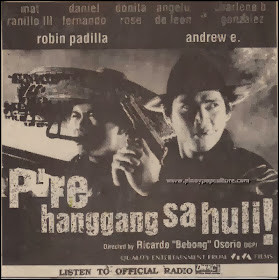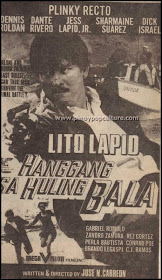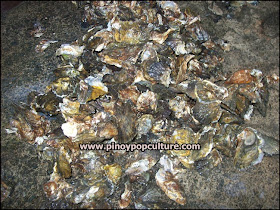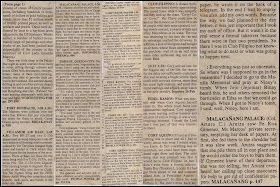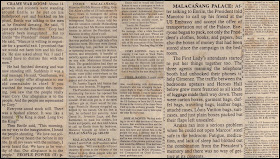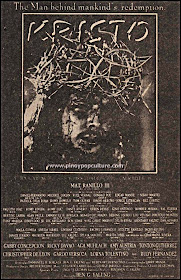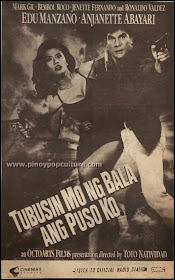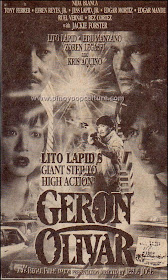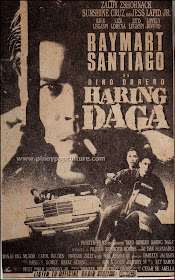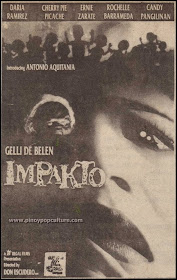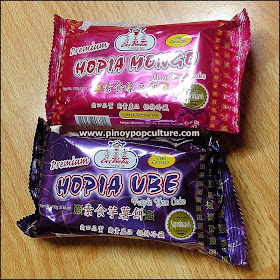Feb. 15, 1895: Jovita Fuentes (d. August 7, 1978) is born in the capital town of Capiz (now Roxas City) in Capiz province. During the 1920s and 1930s, Fuentes gained renown as an opera singer abroad. In 1976, Fuentes became the first Filipina who earned the National Artist in Music.
Feb. 16, 1899: Apolinario Mabini, the Prime Minister of the Philippine Republic under President Emilio Aguinaldo, writes a letter to Galicano Apacible in Hong Kong. The letter informs Apacible of the outbreak of the Filipino-American war on February 4. Mabini blames the Americans for initiating the hostilities. At that time, Apacible is an adviser to the
High Council
of the Revolutionists.
Feb. 17, 1872: Fathers Mariano Gomez, Jose Apolonio Burgos and Jacinto Zamora, better known for the acronym GOMBURZA, were executed by Spanish authorities in Bagumbayan (currently known as Luneta Park) in connection with the 1872 Cavite Mutiny.
GOMBURZA was apparently the target of a hate campaign for these priests' efforts to lead a campaign against abusive Spanish friars and advocate equal rights among priests. Their stand about secularization in the Philippines also led to animosity between religious regulars and church seculars.
Feb. 17, 1897: The Battle of Zapote Bridge between the Spanish forces and the Filipino revolutionaries takes place.
General Emilio Aguinaldo
led Filipino revolutionaries to victory over Spanish troops under Governor-General Camilo de Polavieja. The bridge connected the provinces of Rizal and Cavite.
Feb. 17, 2006: A massive mudslide occurs in Guinsaugon village in the town of Saint Bernard, Southern Leyte province. It is preceded by a ten-day period of heavy rains and an earthquake measuring magnitude 2.6 on the Richter scale. According to official reports, the mudslide claimed 1,126 lives.
Feb. 18, 1976: Broadcast journalist Bernadette Sembrano is born in Manila. Sembrano currently hosts
Salamat Dok!, a current affairs television program that deals with health-related issues. She also anchors
Radyo Patrol Balita on radio.
Feb. 18, 1981: Pope John Paul II beatifies
Lorenzo Ruiz, an altar boy in seventeenth-century Binondo, during his papal visit. The beatification, which was the first held outside the Vatican City, paved the way for Ruiz's elevation to sainthood six years later.
Feb. 19, 1886: Jose Abad Santos (d. May 2, 1942), the fifth Chief Justice of the Supreme Court, is born in San Fernando, Pampanga. Abad Santos' refusal to cooperate with the Japanese led to his execution during the early years of the Second World War in the Philippines. In commemoration of Abad Santos' martyrdom, his image appears on the currently circulating
1,000-peso bill.
Feb. 19, 1888: Aurora Aragon-Quezon, wife of Commonwealth President Manuel L. Quezon, is born in the town of Baler, Tayabas (now Aurora province.) She was known for her involvement in civic organizations.
Aragon-Quezon served as the first chairperson of the Philippine National Red Cross when it was established as an independent Red Cross Organization in 1947. She was also appointed as honorary vice president of the Philippine Tuberculosis Society.
Feb. 19, 1993: Actress and commercial model Empress Schuck. She is currently part of Star Magic, ABS-CBN's roster of talents.
She started her showbiz career as an award-winning child performer in the 2000 film
Nine Mornings. Empress' latest films include
On the Job and
Pagpag: Siyam na Buhay.
Feb. 20, 1862: Francisco Balagtas (b. April 2, 1788), the so-called "Prince of Tagalog Poets" for his contributions to Philippine literature, dies. Balagtas was known for writing
Florante at Laura. A form of debate in extemporaneous verse is named
balagtasan in his honor.
Feb. 21, 1853: Felix Resurreccion Hidalgo (d. March 13, 1913), one of the greatest nineteenth-century Filipino painters, is born in Manila's Binondo district. Hidalgo's silver-medal finish for the painting,
Las virgenes Cristianas expuestas al populacho, at the 1884 Madrid Exposition of Fine Arts is one of the highlights of his career.
In 1904, Hidalgo received a gold medal for his overall participation at the Universal Exposition in St. Louis, Missouri. Another gold medal was accorded to his
El Violinista.
